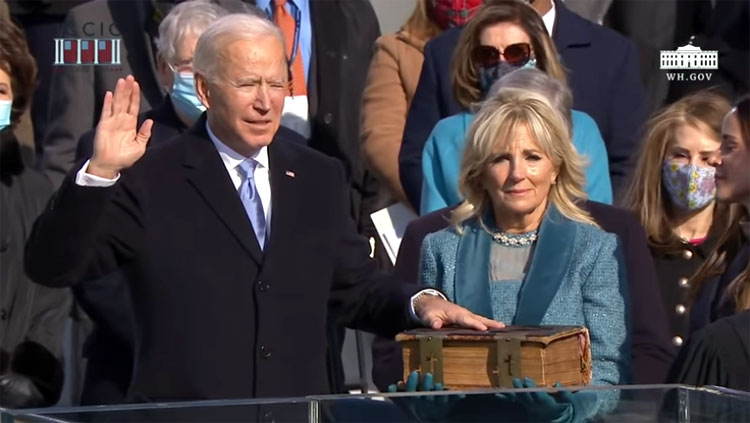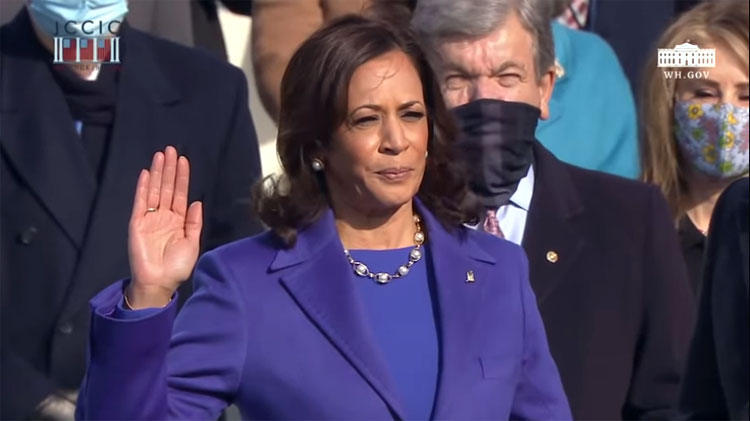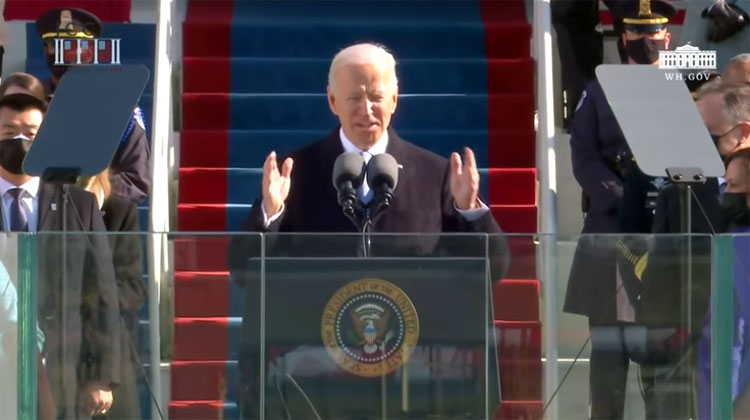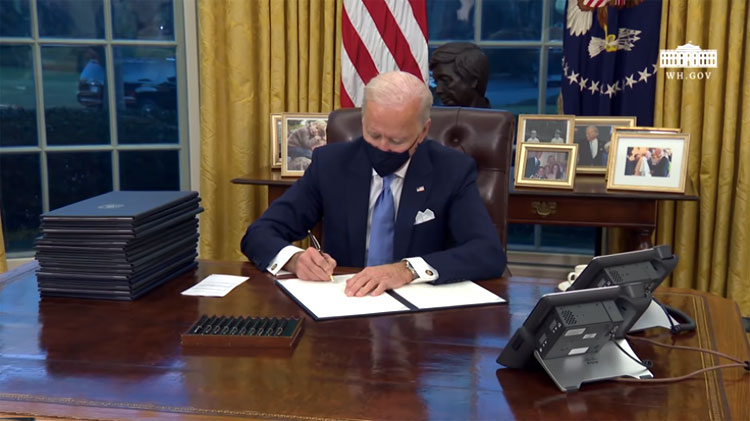INDIAN ARMED FORCES CHIEFS ON
OUR RELENTLESS AND FOCUSED PUBLISHING EFFORTS

SP Guide Publications puts forth a well compiled articulation of issues, pursuits and accomplishments of the Indian Army, over the years

I am confident that SP Guide Publications would continue to inform, inspire and influence.

My compliments to SP Guide Publications for informative and credible reportage on contemporary aerospace issues over the past six decades.
Biden bids adieu to divisions, calls for democracy and unity
With Joe Biden sworn in as the 46th President of the USA, anticipations and hope hold high for the world as well as India.

Being called the symbol of compassion and decency, Joseph Robinette Biden Jr. sworn in as the 46th President of the United States of America, on January 20, 2021. Giving a strong and clear message for democracy and unity as the path forward during his inaugural speech, he stated that America will engage with the world once again and repair alliances. “For without unity, there's no peace, only bitterness and fury. No progress, only exhausting outrage. No nation, only state of chaos...this is our historic moment of crisis and challenge...unity is the path forward,” he stated.
Biden’s statements along with that of Vice-President (VP) Kamala Harris, America’s first women VP have come out to be positive and conducive not only for Americans but for other countries as well.
As the world witnessed this historical presidential ceremony, anticipations soared high of what significant transitions would this change of leadership bring not just to the America but to the world. Biden’s statements along with that of Vice-President (VP) Kamala Harris, America’s first women VP have come out to be positive and conducive not only for Americans but for other countries as well. India too holds hope for a brighter way ahead with significant developments in the long-standing partnership between the two countries.
Democracy’s celebration
“Today, we celebrate triumph not of a candidate but of a cause, the cause of democracy. People and will of the people have been heard. We have learned again that democracy is precious, democracy is fragile and at this hour, my friends, democracy has prevailed, said Biden. As he echoed the call for democracy, the Prime Minister of the world’s largest democracy, India, took the opportunity to congratulate and welcome the stance of the two nations on shared values. “The India-US partnership is based on shared values. We have a substantial and multifaceted bilateral agenda, growing economic engagement and vibrant people to people linkages. Committed to working with President Joe Biden to take the India-US partnership to even greater heights. My warmest congratulations to Biden on his assumption of office as President of the United States of America (USA). I look forward to working with him to strengthen India-US strategic partnership” Prime Minister Modi tweeted.
“The India-US partnership is based on shared values. We have a substantial and multifaceted bilateral agenda, growing economic engagement and vibrant people to people linkages,” India’s Prime Minister Modi tweeted.
Extending his best wishes to the new President for a successful term in leading USA, Modi asserted the unified and resilient stand in addressing common challenges and advancing global peace and security.
Congratulations to @KamalaHarris on being sworn-in as @VP. It is a historic occasion. Looking forward to interacting with her to make India-USA relations more robust. The India-USA partnership is beneficial for our planet.
— Narendra Modi (@narendramodi) January 20, 2021
My warmest congratulations to @JoeBiden on his assumption of office as President of the United States of America. I look forward to working with him to strengthen India-US strategic partnership.
— Narendra Modi (@narendramodi) January 20, 2021
Biden also signed the order to rejoin the Paris climate accord, in which India is at the forefront.
Right on his first day in office, President Biden issued 17 executive orders, presidential memoranda and agency directives. From directing response to the coronavirus, cancelling the Keystone XL pipeline, construction of the border wall, reversing restrictions on US entry for passport holders from seven Muslim-majority countries and many other. Biden also signed the order to rejoin the Paris climate accord, in which India is at the forefront. Until last year, India was the only G20 nations' country on track to meet what it had promised in 2015 under the Paris agreement.

US-India Strategic Partnership gains focus
A series of recommendations were submitted to the new Biden administration by the US-India Strategic and Partnership Forum (USISPF) to take the relationship between the two countries to new heights. Pointing towards the significance of bilateral dialogues, the group stated that the India-US 2+2 strategic dialogue is productive and can be expanded to include commercial issues of national security interest. The group further asserted on India’s representation as a commercial and strategic opportunity for the US in the Indo-Pacific region, also noting that the bilateral trade between the two countries is significant and should be made to meet its potential.
USISPF stated that the India-US 2+2 strategic dialogue is productive and can be expanded to include commercial issues of national security interest.
Other recommendations by the USISPF included:
- holding a Trade Policy Forum (TPF) meeting
- to strengthen cooperation on terrorism and maritime security
- to begin institutionalising military and intelligence cooperation
- intensifying energy ties to assist India in meetings its climate change goals
- restoring regular bilateral engagement, deepening long-term financial ties, and strengthening digital finance and commerce
- exploring healthcare partnership models for robust disease surveillance and data sharing
After taking the oath of office this afternoon, I got right to work taking action to:
— President Biden (@POTUS) January 20, 2021
- Control the pandemic
- Provide economic relief
- Tackle climate change
- Advance racial equity
We're back in the Paris Climate Agreement.
— President Biden (@POTUS) January 21, 2021
The immigration bill
USISPF also encouraged Biden’s pledge to reverse the stance of the previous administration on many immigration policies. These included the temporary ban on the entry of green card applicants as well as non-immigrants seeking entry in the H-1B, L-1, J-1, and H-2B visa categories.
Joe Biden plans to send a comprehensive immigration bill to Congress which among other things proposes to eliminate the per country cap for employment-based green cards. This step is likely to prove beneficial for thousands of Indian IT professionals in the US, whose current wait period for legal permanent residency runs into several decades. The bill reportedly also reforms the family-based immigration system by recapturing unused visas to clear the backlog, eliminating the lengthy waits, and increases their per country visa caps alongside eliminating the bars and other provisions that have kept families apart.

Indian IT professionals, most of whom come to the US mainly on the H-1B work visas, have undergone an array of challenges under the current immigration system which imposes a seven per cent per country quota on allotment of the coveted Green Card or permanent legal residency. After the November election outcome, a document of the Biden transition had reportedly said he will reform the visa system that has kept so many Indian families in waiting for too long.
Joe Biden plans to send a comprehensive immigration bill to Congress which among other things proposes to eliminate the per country cap for employment-based green cards.
India-US Defence ties
Coming to the defence partnerships between the two nations, the Obama-Biden Administration had named India a 'Major Defence Partner' that made it easier to share advanced and critical technology to India to strengthen defence ties.
The U.S. Defense Secretary nominee, Lloyd J Austin had also recently stated about his overarching objective for defence relationship with India adding that he will operationalise India's "Major Defence Partner" status and build upon the existing strong defence cooperation between the two countries to ensure the US and Indian militaries can collaborate to address shared interests.
The Defence Secretary nominee, Lloyd J Austin had also recently stated that he will operationalise India's "Major Defence Partner" status and build upon the existing strong defence cooperation between the two countries to ensure the US.
Austin had also added that he would seek to deepen defence cooperation with India through the QUAD security dialogue and other regional multilateral engagements. QUAD is a four- nation grouping of India, US, Japan and Australia, viewed by China as a threat to its dominance in the Indo-Pacific region.
Bilateral relations of the largest democracies
Going by the previous history of Biden even during his term as the VP of the USA under President Barack Obama, his support towards India-friendly legislations has been observed including his role in the signing of the Indo-US nuclear deal, his advocacy to strengthen the Indo-US partnership, especially in strategic areas, and his support for India's permanent membership in the United Nations Security Council.
Under the Biden administration, the bilateral relations between the two nations are likely to expand further under the backdrop of his involvement in the significant documents like, 'US-India Joint Strategic Vision for the Asia-Pacific and Indian Ocean Region' which was released after the 2015 Modi-Obama meet. In 2016, the two countries had also signed the Logistics Exchange Memorandum of Agreement (LEMOA) for deeper military cooperation. LEMOA also proved beneficial in the Indo-US naval co-operation.

Apart from Lloyd, the U.S. Secretary of State nominee Anthony Blinken is also batting for stronger India-US relations. Blinken had recently remarked that India has been a "bipartisan success story" of successive American administrations.
“In a Biden administration, we would be an advocate for India to play a leading role in international institutions and that includes helping India get a seat on a United Nations Security Council,” the secretary of state nominee Anthony Blinken had said.
Blinken has repeatedly participated in a panel discussion on Indo-US ties, and flagged the issue of UN reforms. “In a Biden administration, we would be an advocate for India to play a leading role in international institutions and that includes helping India get a seat on a United Nations Security Council,” he had said. Blinken also addressed New Delhi’s concern of cross-border terrorism, saying, “We would work together to strengthen India’s defence and also I might add its capabilities as a counterterrorism partner.” In the fight against terrorism, India and the US have worked closely with each other earlier as well. Biden's campaign document also says, 'Biden believes there can be no tolerance for terrorism in South Asia - cross-border or otherwise.'
Indian diaspora
There also seems to be a strong presence of Indian Americans in the Biden-Harris cabinet. There have already been 20 Indian Americans either nominated or named to key positions, including 13 women. During his campaign as well, Biden had indicated that he would rope in a large number of Indian Americans. “As President, I'll also continue to rely on Indian-American diaspora, that keeps our two nations together, as I have throughout my career,” Biden had said in his address to the Indian-American community during a virtual celebration of India's Independence Day last year.
With some of these initial anticipations, initiatives and expectations, the coming of the Biden-Harris era seems to hold a positive promise of enhancing the strategic partnership of India with the USA and paint an impactful picture of both the nations globally. As this era begins, time alone will showcase how the coming along of the two countries will transpire.





